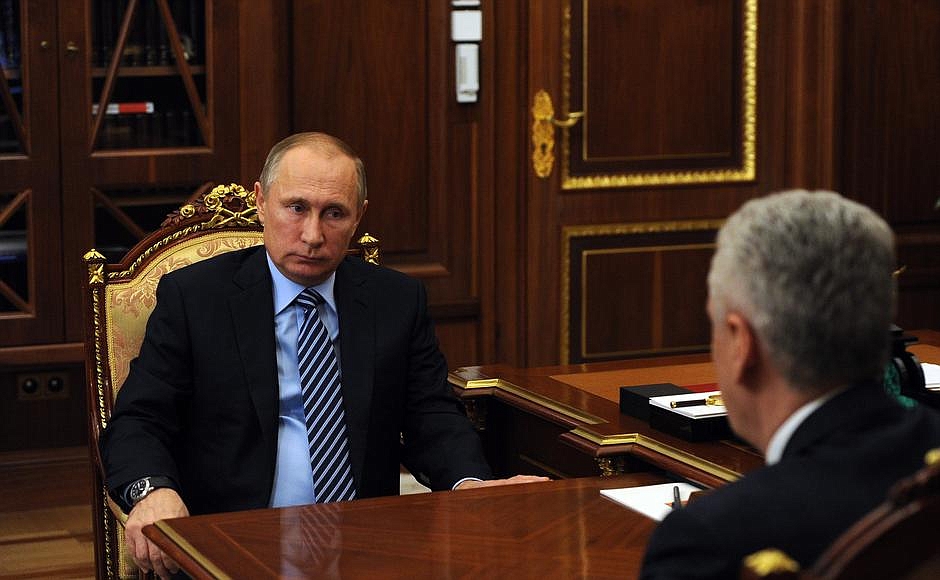Views expressed in opinion columns are the author’s own.
After about three years and nearly 10,000 deaths, the conflict in eastern Ukraine is raging on, despite the attempt at peace in the Minsk Peace Agreement. Fighting between pro-Russian separatists and Ukrainian government forces has continued in the rebel held portions of Donetsk Oblast, labeled by the separatist forces as the Donetsk People’s Republic. With the Trump administration still getting its sea legs in the foreign policy arena, a question has arisen as to how it will decide to handle Russian President Vladimir Putin’s bold intervention in Ukraine. While it may be tempting for the United States to cut ties with the frozen mess east of the European Union, doing so risks the integrity of the international system.
The conflict began when the Euromaidan protests brought down Ukrainian President Viktor Yanukovych. Widely viewed as corrupt and authoritarian, Yanukovych sparked the protests after he squashed a trade deal with the EU in favor of a pro-Russian business stance. Since then, Moscow has continued to accuse the West of illicitly coaxing the regime change. And Russia’s primary goal throughout the conflict — for Ukraine to grant autonomy to the Donetsk Oblast and Crimea, its pro-Russian regions in the east — has endured. Such a concession would set a dangerous precedent that the territorial boundaries traditionally held sovereign can be manipulated through hybrid warfare.
In March 2014, then-Secretary of State John Kerry explained to CBS’ “Face the Nation” the importance of maintaining reverence for national sovereignty and condemned Russia for behaving in a “19th century fashion”. It wasn’t long before the Obama administration began to sanction Russian energy exports alongside the EU. This was a prudent decision.
The modern world order is built on the promise that bigger nations don’t invade smaller ones. If the Trump administration were to repeal sanctions, they’d be abandoning the United States’ role as a guarantor of that concept. In the Baltic states, Russian posturing and an ambivalent Trump has already put the military on edge, despite the military support President Obama ordered in the twilight hours of his own administration. These NATO member-states aren’t necessarily threatened by an outright invasion, but instead by the sort of asymmetric, hybrid warfare that defined the Ukrainian crises. To ignore these threats to national sovereignty is to encourage further territorial challenges by autocrats with a penchant for 19th century power plays. Unfortunately, ceding the Ukrainian crises to Putin does more than threaten the Baltic states, it undermines the regional strategies of one of our major allies.
Since reunification, the German state has become the largest economy in Europe, and the unequivocal protagonist of the continent’s leadership. Early in the Ukrainian crises, German Chancellor Angela Merkel did a lot of maneuvering to align EU partner states with her objective of countering Russian posturing. And with a tumultuous Ukraine only a 10-hour drive away, German leadership is resolved to continue those sanctions. By siding with Russia, the United States would be rewarding an aggressor at the expense of a close ally. Aside from being politically problematic, such a move would be counter to American interests. The 28 EU member-states make up the largest economy in the world. Deserting the EU trade bloc in favor of closer ties to Russia, which has an economy the size of Italy, yields a net loss for Americans.
As Putin’s Russia slips deeper into a financial crisis, he must be persuaded that the only way to calm his agitated oligarchs is through compliance. The Crimean Peninsula, which may be irreparable as is, could be conceded to Putin as a way for him to save face with the Russian public. The removal of sanctions should be hinged on the withdrawal of Russian agitators in Eastern Europe to include Donetsk Oblast and ongoing interference in European elections. To put it bluntly, any measure by the Trump administration sans a consequence for Russian aggression will give Putin the green light to interfere elsewhere.
Kyle Rempfer is a sophomore government & politics and Russian major. He can be reached at krempfer@terpmail.umd.edu.



